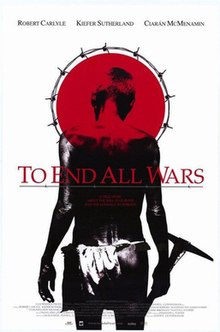To End All Wars
To End All Wars is a 2001 war film starring Robert Carlyle, Kiefer Sutherland and Sakae Kimura and was directed by David L. Cunningham. The film is based on Through the Valley of the Kwai, an autobiography of Scottish captain Ernest Gordon.
| To End All Wars | |
|---|---|
 Theatrical release poster | |
| Directed by | David L. Cunningham |
| Produced by | Jack Hafer David L. Cunningham |
| Written by | Brian Godawa Ernest Gordon |
| Starring |
|
| Music by | John Cameron Moya Brennan |
| Cinematography | Greg Gardiner |
| Edited by | Tim Silano |
| Distributed by | Argyll Film Partners |
Release date | |
Running time | 125 minutes |
| Country | United States |
| Language | English Japanese |
| Budget | $14 million |
Plot
The film is set in a Japanese prisoner of war labour camp where the inmates are building the Burma Railway during the last three and a half years of World War II.[3] Captain Ernest Gordon was a company commander with the 2nd Battalion, Argyll and Sutherland Highlanders who fought in several battles in the Malayan Campaign and the Battle of Singapore before being captured and made a prisoner of war by the Japanese.
Cast
- Robert Carlyle as Maj. Ian Campbell
- Kiefer Sutherland as Lt. Jim "Yanker" Reardon, an American Merchant Mariner in Singapore at the time of capture.
- Ciarán McMenamin as Capt. Ernest "Ernie" Gordon
- Mark Strong as Dusty Miller
- Sakae Kimura as Sgt. Ito
- Masayuki Yui as Cpt. Noguchi
- James Cosmo as Col. Stuart McLean
- John Gregg as Dr. Coates
- Shu Nakajima as Nagatomo
- Yugo Saso as Takashi Nagase
- Pip Torrens as Lt. Foxworth
- Adam Sinclair as Jocko
- Winton Nicholson as Duncan
- Brendan Cowell as Pte. Wallace Hamilton
- Greg Ellis as Sgt. Roger Primrose
- James McCarthy as Norman
- Daryl Bonilla as POW
Production
It was filmed primarily on the island of Kauai, Hawaii, with some excerpt shots of Thailand. The film was rated R in the U.S. for war violence and brutality, and for some language. The film was produced by Jack Hafer and David Cunningham.[4]
The screenplay is based on the autobiography of Ernest Gordon and recounts the experiences of faith and hope of the interned men.[5] The autobiography was originally published under the name Through the Valley of the Kwai,[6] then later as Miracle on the River Kwai (not to be confused with the separate novel The Bridge over the River Kwai by Pierre Boulle). Gordon's book was finally re-issued with the title To End All Wars to tie in with the film.
Post-production of the film footage was delayed because of lack of funding, which was eventually provided by Gold Crest Films.[7]
Reception
On the review aggregation website Rotten Tomatoes the film has a score of 62% based on reviews from 13 critics, with an average rating of 5.9/10.[8] The film was awarded the Crystal Heart Award and Grand Prize for Dramatic Feature at the Heartland Film Festival.[9] A review in Variety is mainly negative.[3]
Soundtrack
The film's soundtrack was never released as a stand-alone release. Various songs have been re-recorded by Moya Brennan on her subsequent solo albums, most recently 'Mo Mhian' on My Match Is A Makin'.
| No. | Title | Writer(s) | Length |
|---|---|---|---|
| 1. | "Mo Mhian (Healing Heart)" | Moya Brennan | |
| 2. | "I Will Go (Campbell's Theme)" | Moya Brennan | |
| 3. | "Lá na Cruinne" | Moya Brennan | |
| 4. | "Find The Place" | John Cameron & Moya Brennan | |
| 5. | "Amazing Grace" | John Newton / Traditional | |
| 6. | "Pomp And Circumstance" | Edward Elgar | |
| 7. | "Jesu, Joy of Man's Desiring" | Johann Sebastian Bach | |
| 8. | "Yankee Doodle Boy" | George M. Cohan |
References
- McCarthy, Todd (September 3, 2001). "Telluride spreads broad tents". Variety. Retrieved July 11, 2020.
- Willis, John (February 2004). Screen World 2003. Hal Leonard. p. 211. ISBN 9781557835284.
- "Review: ‘To End All Wars’". Variety, Dennis Harvey. June 18, 2002
- Alex Field (2004). The Hollywood Project: A Look Into the Minds of the Makers of Spiritually Relevant Films. Relevant Media Group. pp. 141–. ISBN 978-0-9746942-1-4.
- "TO END ALL WARS". Urban Cinefile
- "No Headline". New York Times, By DAVID STOUTJAN. 20, 2002
- "Isle filmmaker makes his triumphant return". Star-Bulletin, Honolulu, November 1, 2001 Tim Ryan
- To End All Wars (2001) rottentomatoes.com
- "Heartland Winner Returns". The Indianapolis Star. Indianapolis, Indiana. November 10, 2002. Page 140
External links
| Wikiquote has quotations related to: To End All Wars |